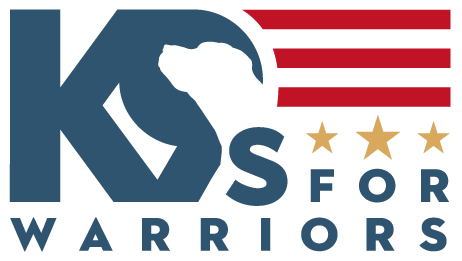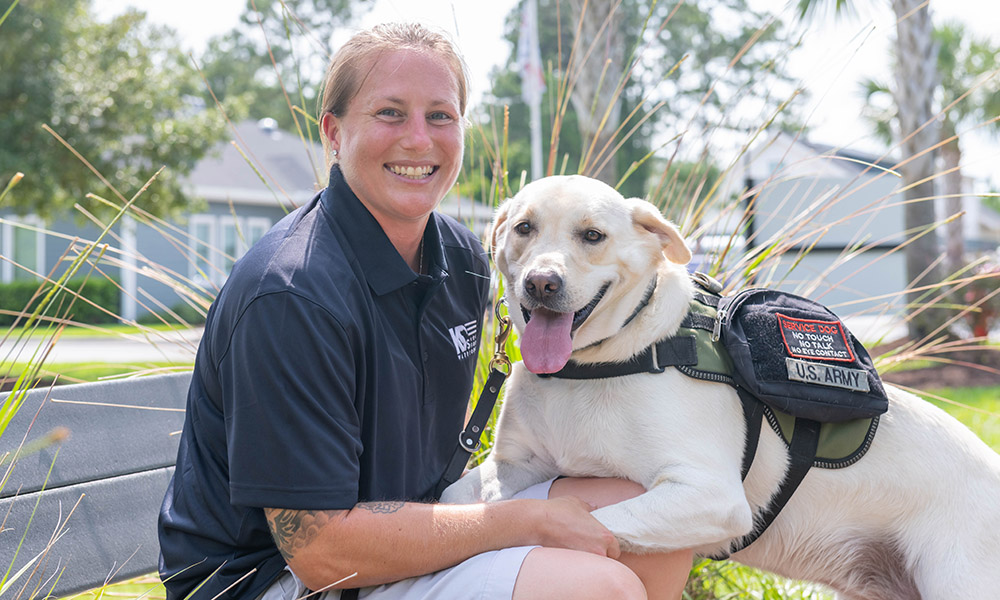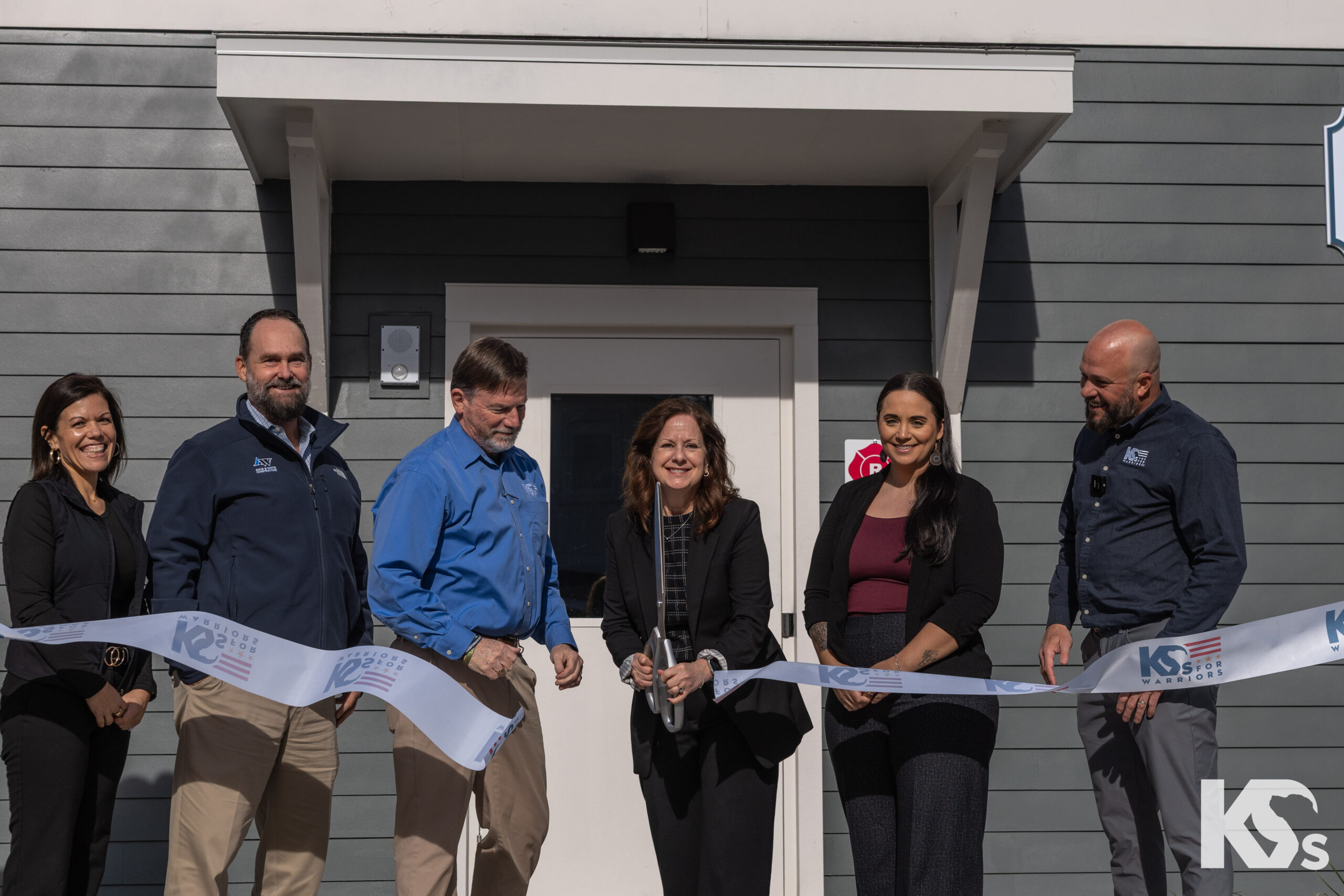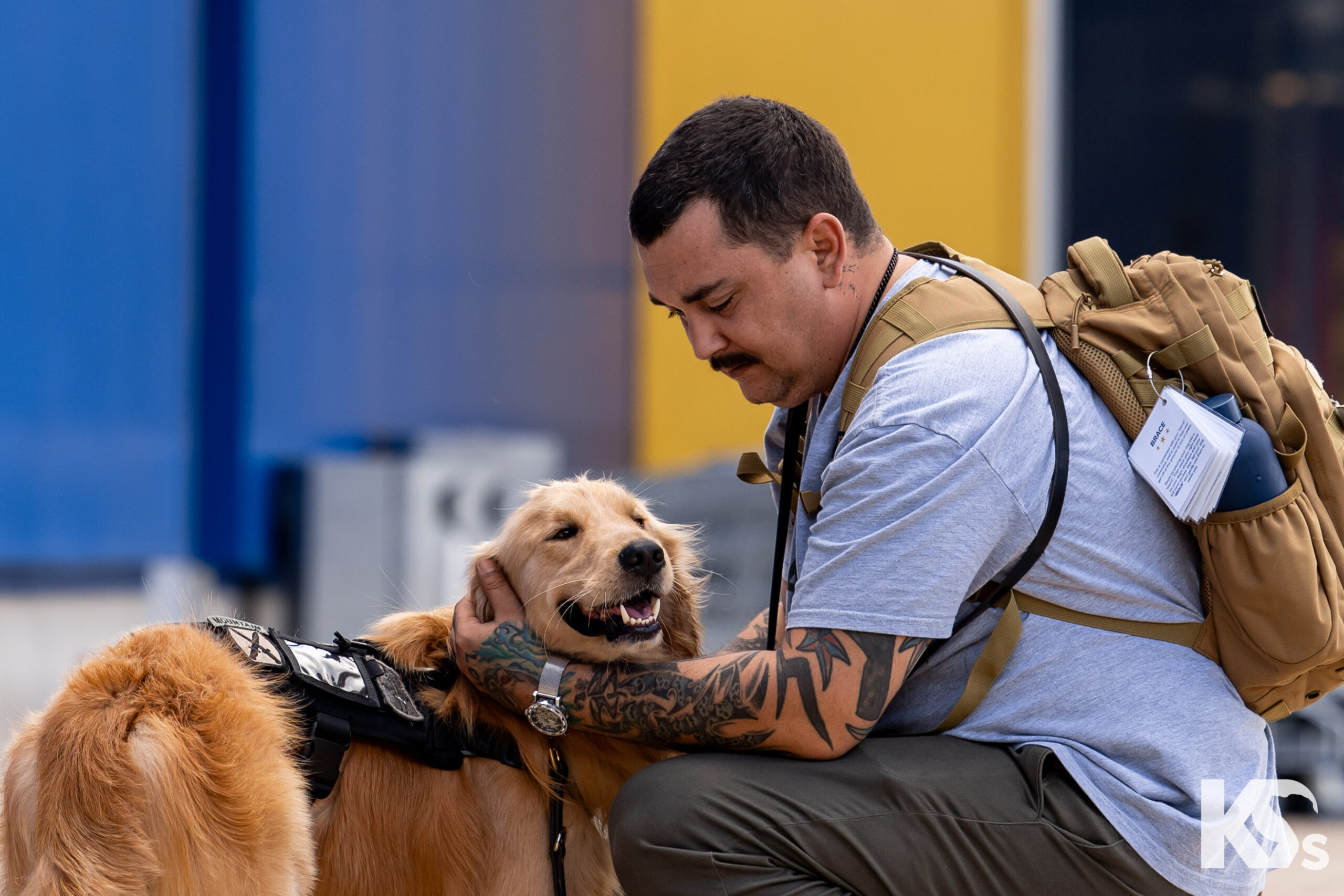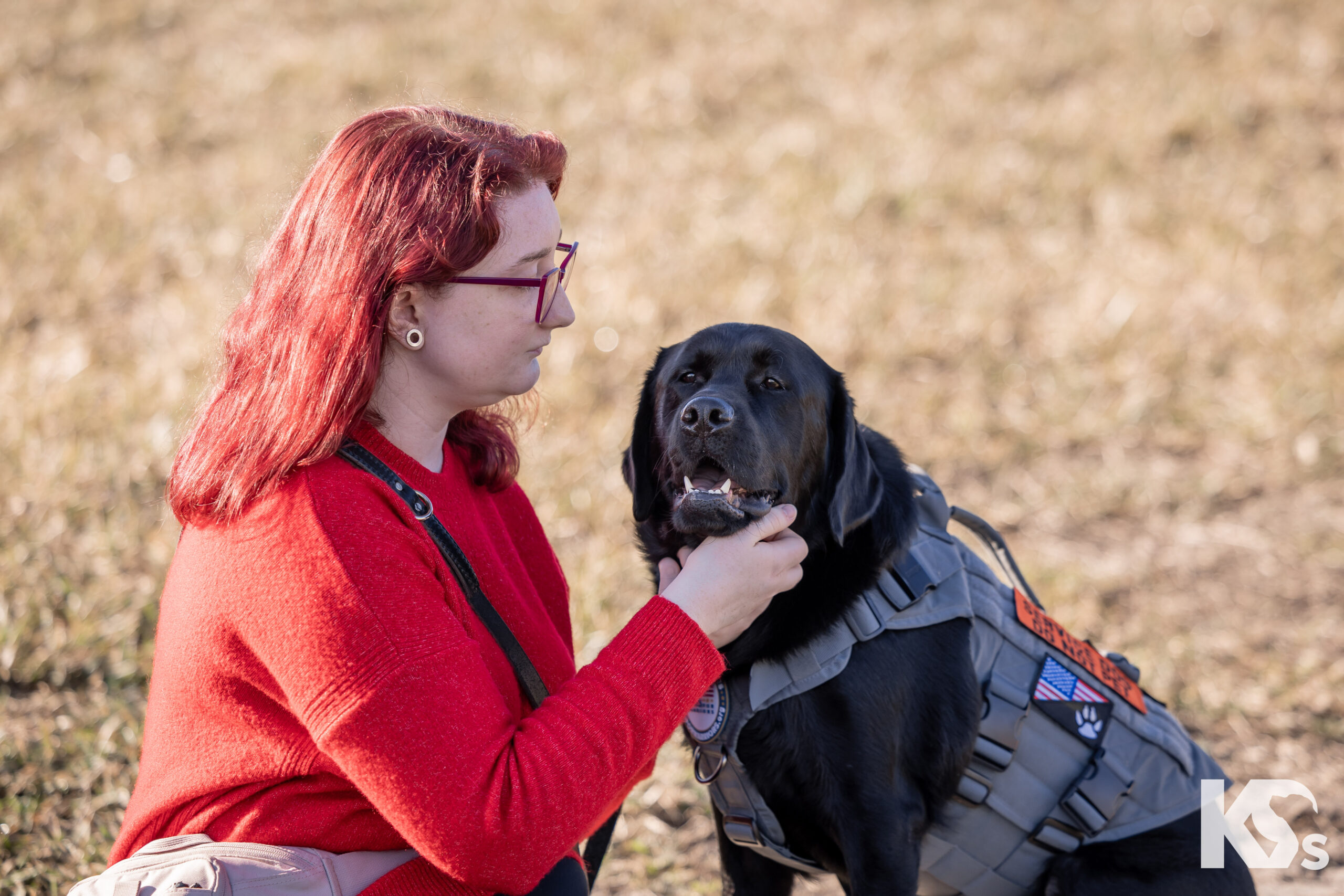Roughly 20 veterans commit suicide every day, most unable to reconcile with PTSD symptoms that plague them upon returning home from deployment.
Meet Becca
A complex and winding road eventually led Army veteran Becca Stephens to a Service Dog from K9s For Warriors, ultimately saving her from joining the more than 89,000 veterans who took their own life between 2005-2018, according to the Department of Veterans Affairs (VA).
Originally from Florida, Stephens deployed to Iraq in July 2009 as a signal support specialist, setting up radios, antennas, satellites, and computers.
In June 2010 she returned from deployment to Washington (state), having experienced the trauma of war while losing several fellow soldiers who had served alongside her. Struggling to regain her sense of identity, she subsequently exited the Army in March 2011 upon completing her service contract.
“I didn’t understand how much of an impact the military community has on an individual,” Stephens said. “I sincerely felt like I lost my whole family and anyone who understood what I was going through.”
At the time, Stephens battled persistent bouts of anger, depression, had difficulty sleeping, and – when she was able to sleep – had frequent nightmares. Exacerbated further by excessive drinking, she sought out a VA facility and immediately received a PTSD diagnosis.
“When you’re in the military, you’re like an ice cube in the freezer. But as soon as you get out you start dealing with the civilian world and how mental illness is affecting you. It’s like ice being removed from the freezer and melting everywhere. That’s how I felt.”
Living in Washington by herself, she was surprised when the VA-prescribed medication failed to alleviate her symptoms.
“When the medication didn’t help, I started to feel like something was really wrong with me.”
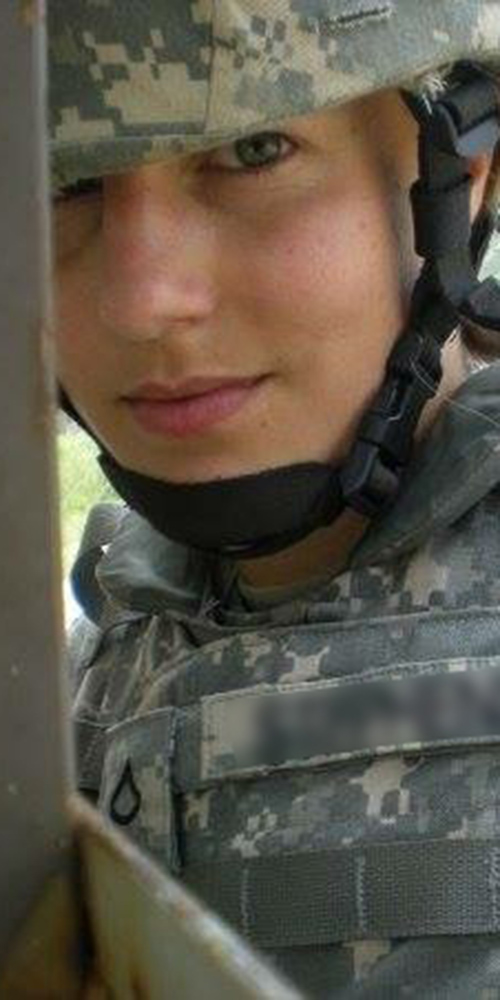
I didn’t understand how much of an impact the military community has on an individual, Stephens said. I sincerely felt like I lost my whole family and anyone who understood what I was going through.
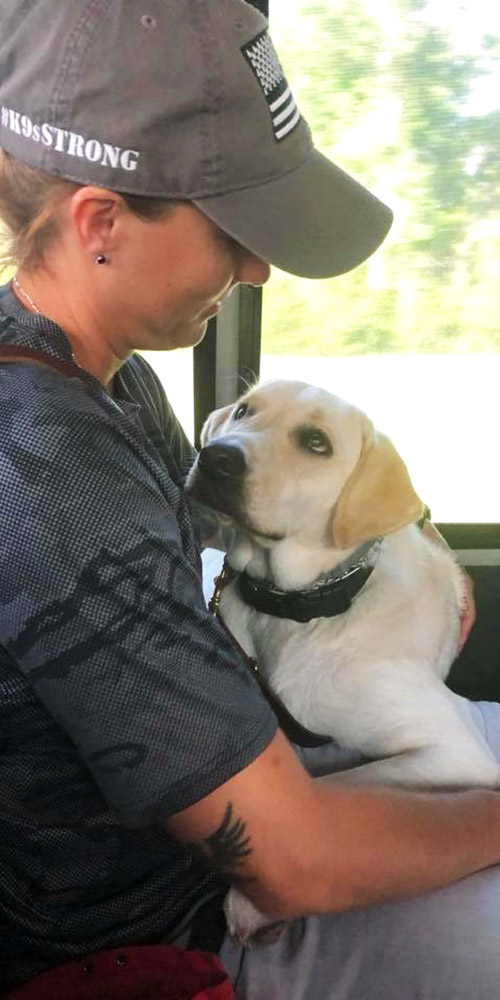
Self-Medicating
She decided to approach a friend who – at the time – was self-medicating with the equivalent of Percocet.
“One day he gave me one, and I felt the world lifted off my shoulders. Every day I had a sinking feeling in my stomach and, when I took these pills, it went away. I actually felt happy.”
What began as a five-milligram dose turned into 30 milligrams, and it compounded from there. One day when the person supplying Stephens with the drug didn’t have any, she figured it’d be no big deal to make it through the day without it.
“Then you realize you’re physically and mentally addicted to this thing. You start sweating and getting sick and can’t stop panicking. When I called him back and he offered up heroin, it blows me away how quickly I told him I was on my way over. The was a real turning point in my life.”
February 2012 was the first time Stephens used heroin. By December, she had blown through her entire savings of about $30,000 she’d earned from her service in Iraq. She had no money to pay for rent or bills. After getting evicted, her mom flew to Washington, and they trekked 3,000 miles in the car back to Florida.
Struggling to Accept Help
After moving back in with her parents, Stephens went cold turkey to get sober. However, after meeting up with an old friend who happened to be using at the time, she began the cycle all over again. Her parents suspected something wasn’t right, as Stephens was rarely around, and was clearly out of it when she was home.
“They caught me standing in the bathroom with my eyes completely shut because I was so high. When they went through my bedroom, they found my used needles, and then came an ultimatum. Up until that point I hadn’t done any of the work to try to get better.”
Stephens went to a VA rehab center, which would kickstart a four-year span of sobriety from drugs. She spent that period traveling the country in an RV yet was still heavily drinking every day to self-medicate.
Then, in late 2016, she returned home to Florida to help care for her sick grandmother. When she died in May 2017 it became the first of what would become a sequence of disparaging episodes to follow. In September, Hurricane Irma left Stephens feeling anxious and fearful, going without power or gas for a prolonged period with no ability to return home.
A few months later, a loved one of Stephens was murdered. Relating the death back to those she had lost in Iraq, Stephens reflects on this moment as the final straw that broke the camel’s back, losing all hope and passion for life and leading her back to addiction.
By the summer of 2018, she was using heavily and lying about it to her parents and her girlfriend, Kelli. Stephens was breaking promises, missing work, and losing a lot of weight. One day, Kelli noticed that some of her jewelry was missing, which she soon learned Stephens had stolen and sold in order to pay for drugs.
“That day I confirmed Kelli’s worst fears, that I was actively using,” Stephens said. “I’ll never forget the look in her eyes. I felt like I could see her entire world fall apart with just one glance.”
“I don’t think I knew exactly how to process it at the time,” Kelli recalls. “Part of me also felt responsible because – with my work schedule – I couldn’t stay home all day to watch her.”
Kelli told Stephens to start packing her things and to call her parents, who took her back in, like they had done before. That same night, Stephens sat on her childhood bed in chills and in pain, thinking to herself that something had to change.
“Ending everything and killing myself was a very real option,” she recalls. “Or I could choose life and throw everything I had at sobriety and giving it another shot.”
Ending everything and killing myself was a very real option, she recalls. Or I could choose life and throw everything I had at sobriety and giving it another shot.
Deciding to Change
Stephens made a list and said there were a hundred things that pointed toward suicide, yet two things on the side of choosing to live ultimately won out: Kelli, and her application to K9s For Warriors that had been approved.
“Kelli could have easily given up on me and walked away,” Stephens said. “She decided not to, and that meant more to me than anything. She is the most integrity-driven person I’ve ever met and is a role model of mine.”
Stephens had been on K9s For Warriors’ waitlist for 16 months and at that point was two months shy of being paired with a dog for training. She returned to the VA rehab center, where she got sober on June 6, 2018.
“An addict has to want to do the work,” Kelli said. “But with Becca going back into rehab, I couldn’t just disappear. I made it very clear that I was not okay with this behavior. But I also wanted to be there for her as a support system and a sounding board, because I knew this was obviously a low point in her life.”
“If Kelli and K9s For Warriors hadn’t been so relevant at that moment in my life, that list of choosing suicide would have completely consumed me,” Stephens said. “I would have found a way to end my life that night – no questions asked.”
Despite having a sense of optimism when arriving on campus at K9s For Warriors in August 2018, Stephens also was skeptical and terrified.
“You’re putting so much into an organization that you don’t know. Being an untrustworthy person myself, you wonder if you’re putting too much faith in K9s For Warriors if it weren’t to work out. But from the moment I got there, they kind of swept me off my feet. I hadn’t been happy in my life since I was a kid, but I was happy.”
She was paired with Bobbi, a Labrador, who had been trained as a Service Dog in the months prior. Recounting the moment they met for the first time and clipping her leash on Bobbi’s collar, Stephens’ skepticism melted away.
“You get overwhelmed with the dog’s energy and compassion, knowing she is going to save my life. If you’re looking for a moment of clarity, this was it. It was like the scene in ‘Avatar’ when they attach themselves to the animal. That’s exactly how I felt.”
During their three weeks of training, Stephens found out that Bobbi was originally paired to be a Service Dog for a different veteran, but it hadn’t worked out.
Bobbi was excelling at the commands she was receiving from Stephens but also was standoffish and reluctant to show affection. Stephens decided to use that as motivation to build a lifechanging bond with Bobbi.
“I could see a part of me in her,” she recalled. “I’ve completely burned bridges, and I feel like a lot of people had given up on me. I was determined to make this work out for Bobbi. I still hadn’t forgiven myself, and we worked through all of that together.
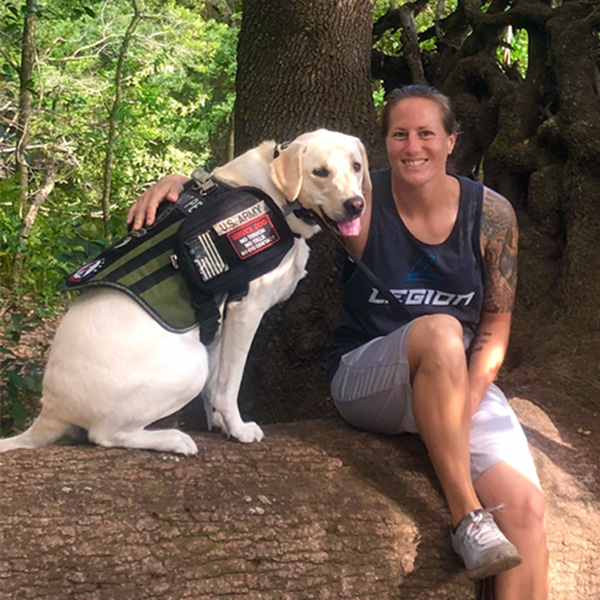
The Path Forward
Now, she takes Bobbi for a walk in the park every morning. Her parents join them, which Stephens says has provided the opportunity to repair their relationship which was so badly destroyed through her PTSD and addiction. She also has been able to build relationships with other regulars in the park, thanks to their curiosity and questions about Bobbi and her Service Dog vest.
“Bobbi has given Becca someone to be responsible for and another reason to live,” Kelli said. “When they go to the park, it sparks conversations with complete strangers. Before Bobbi, she never would have talked with these people.”
“I have a whole new sense of confidence with Bobbi,” Stephens said. “It’s a safe environment where if Bobbi feels safe, I feel safe. She’s allowed me to grow in so many ways.”
Healing and Helping
Stephens also feels compelled to talk about her own journey in hopes of helping other veterans who continue to suffer from PTSD.
“Veterans are the heart and soul of this country, and some of us feel like we are drowning. It’s hard because we’ve been trained to look out for everyone but ourselves. We need more options than what is currently being provided by the VA or healthcare givers. So, to have K9s For Warriors as an option with Service Dogs – it opens up a whole new possibility that you really can get better.”
A possibility that became a reality for Stephens, despite the many obstacles that stemmed from her PTSD symptoms.
“With all the work Bobbi and I have done together, she’s just brought so much gratitude into my life. I will always be extremely grateful for having the option of a Service Dog.”
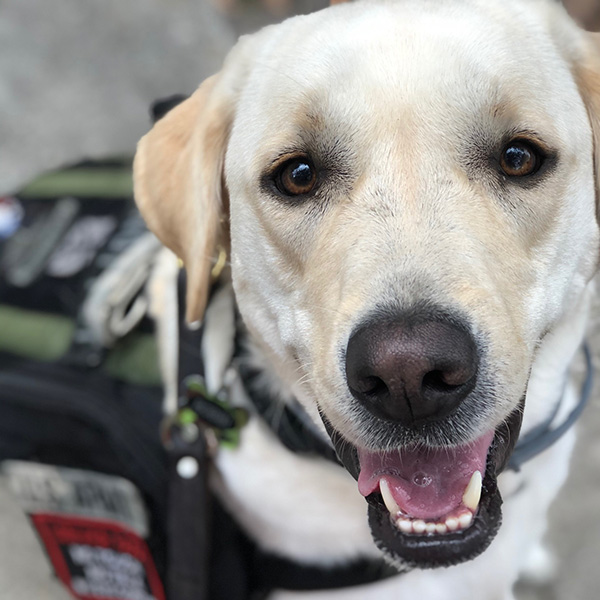
MEET BOBBI
Becca & Bobbi Graduated from K9s For Warriors
August 2018
Bobbi’s Sponsor
Westlake Animal Groups
Name Meaning
Bobbi was named in memory of Bill Nordstrom’s wife.
Bobbi
Donated and puppy raised
